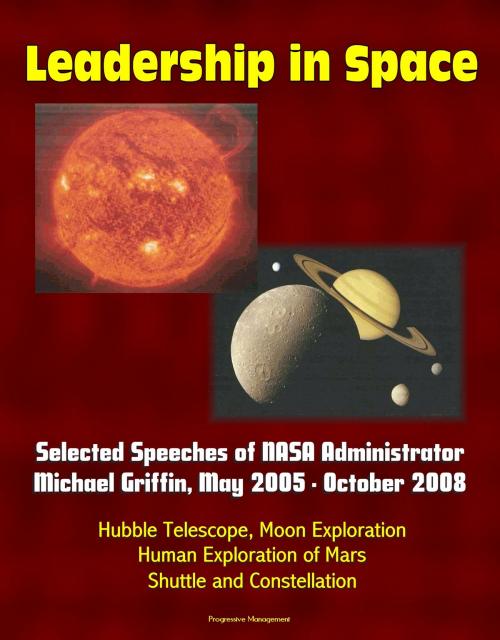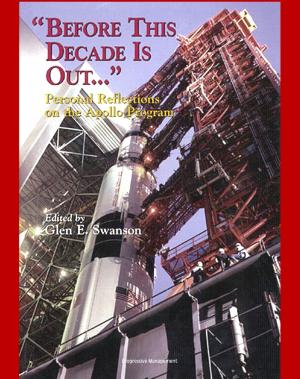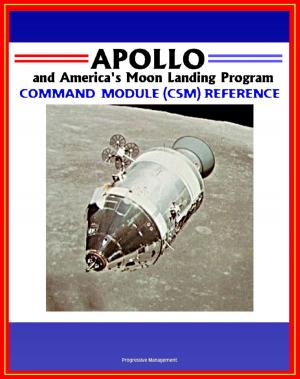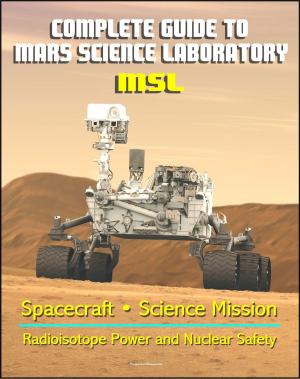Leadership in Space: Selected Speeches of NASA Administrator Michael Griffin, May 2005 - October 2008 - Hubble Telescope, Moon Exploration, Human Exploration of Mars, Shuttle and Constellation
Nonfiction, Science & Nature, Technology, Aeronautics & Astronautics, Science, Physics, Astrophysics & Space Science| Author: | Progressive Management | ISBN: | 9781311781307 |
| Publisher: | Progressive Management | Publication: | May 16, 2015 |
| Imprint: | Smashwords Edition | Language: | English |
| Author: | Progressive Management |
| ISBN: | 9781311781307 |
| Publisher: | Progressive Management |
| Publication: | May 16, 2015 |
| Imprint: | Smashwords Edition |
| Language: | English |
Professionally converted for accurate flowing-text e-book format reproduction, this NASA report presents selected speeches of former NASA Administrator Michael Griffin from 2005 through 2008. Contents:
Part 1 - Exploration and Our Future * Leadership in Space * (California Space Authority, 12/2/05) * Space Exploration: Real and Acceptable Reasons * (Quasar Award Dinner, 1/19/07) * Why Explore Space? * (Op-Ed on McClatchy/Tribune Wire Service, 1/18/07) * Space Exploration: Filling up the Canvas * (Langley Colloquium Series, 10/24/06) * Continuing the Voyage: The Spirit of Endeavour * (Royal Society of the UK, 12/1/06) * Incorporating Space into Our Economic Sphere of Influence * (World Economic Forum 1/26/07) * The Role of Space Exploration in the Global Economy * (NASA's 50th Anniversary Lecture Series, 9/17/07) * Partnership in Space Activities * (International Astronautical Congress, 10/3/06) * International Space Cooperation * (French National Assembly, 6/5/08) * National Strategy and the Civil Space Program * (National Space Symposium, 4/12/07) * What the Hubble Space Telescope Teaches Us about Ourselves * (Institute for Human and Machine Cognition, 7/24/08) * Part 2 - NASA, Science, Commerce and Engineering * The Rocket Team * (Annual Von Braun Dinner, 10/22/07) * NASA's Direction * (Mars Society, 8/3/06) * Science and NASA * (GSFC, 9/12/06) * Science Priorities and Program Management * (NAC Science Subcommittee, 7/6/06) * NASA and the Commercial Space Industry * (X-Prize Cup Summit, 10/19/06) * NASA and the Business of Space * (AAS, 11/15/05) * American Competitiveness: NASA's Role & Everyone's Responsibility * (Calvin College, 1/17/08) * Space Exploration: A Frontier for American Collaboration * (Georgetown University, 11/16/07) * The Next Generation of Engineers * (PSE, 1/19/06) * System Engineering and the "Two Cultures" of Engineering * (Purdue University, 3/28/07) * Generalship of Engineering * (The Johns Hopkins University Commencement, 5/24/06) * NASA and Engineering Integrity * (American Astronautical Society, 10/21/08) * Part 3 - Getting There from Here * The Constellation Architecture * (STA, 1/22/08) * Then and Now: Fifty Years in Space * (AIAA, 9/19/07) * The Reality of Tomorrow * (National Space Symposium, 3/5/08) * Human Space Exploration: The Next 50 Years * (AW&ST, 3/14/07)
Griffin writes: I sought to offer through my public addresses a more complete rationale for human presence in space. In various speeches I tried to illustrate the connections between a vigorous program of human space exploration and important societal interests including national security; the value of leadership and partnership in great enterprises; the effect on our industrial base and economic competitiveness of learning how to do very hard things; the spread of values and culture among the worlds of the future; the long-term survival of the human species; and, yes, enhanced possibilities for scientific discovery. Part 1 of this collection offers a collection of speeches addressing various aspects of that broad theme. Because the exploration and development of the space frontier is a strategic issue for the United States, NASA touches important segments of society on many levels. Learning how to live and work in space or sending our machines there on our behalf has profoundly influenced and in some cases redefined the practice of commerce, science, engineering and management in our nation and the world. Part 2 includes speeches on various aspects of such influence. In particular, I am persuaded that we owe the modern practice of system engineering and its allied discipline, systems management, to the driving force of the early civil and military space programs. I believe these disciplines are crucial to our success in a competitive global society yet are widely misunderstood; and so I have included in this section some material outlining my views on what system engineering is and is not.
Professionally converted for accurate flowing-text e-book format reproduction, this NASA report presents selected speeches of former NASA Administrator Michael Griffin from 2005 through 2008. Contents:
Part 1 - Exploration and Our Future * Leadership in Space * (California Space Authority, 12/2/05) * Space Exploration: Real and Acceptable Reasons * (Quasar Award Dinner, 1/19/07) * Why Explore Space? * (Op-Ed on McClatchy/Tribune Wire Service, 1/18/07) * Space Exploration: Filling up the Canvas * (Langley Colloquium Series, 10/24/06) * Continuing the Voyage: The Spirit of Endeavour * (Royal Society of the UK, 12/1/06) * Incorporating Space into Our Economic Sphere of Influence * (World Economic Forum 1/26/07) * The Role of Space Exploration in the Global Economy * (NASA's 50th Anniversary Lecture Series, 9/17/07) * Partnership in Space Activities * (International Astronautical Congress, 10/3/06) * International Space Cooperation * (French National Assembly, 6/5/08) * National Strategy and the Civil Space Program * (National Space Symposium, 4/12/07) * What the Hubble Space Telescope Teaches Us about Ourselves * (Institute for Human and Machine Cognition, 7/24/08) * Part 2 - NASA, Science, Commerce and Engineering * The Rocket Team * (Annual Von Braun Dinner, 10/22/07) * NASA's Direction * (Mars Society, 8/3/06) * Science and NASA * (GSFC, 9/12/06) * Science Priorities and Program Management * (NAC Science Subcommittee, 7/6/06) * NASA and the Commercial Space Industry * (X-Prize Cup Summit, 10/19/06) * NASA and the Business of Space * (AAS, 11/15/05) * American Competitiveness: NASA's Role & Everyone's Responsibility * (Calvin College, 1/17/08) * Space Exploration: A Frontier for American Collaboration * (Georgetown University, 11/16/07) * The Next Generation of Engineers * (PSE, 1/19/06) * System Engineering and the "Two Cultures" of Engineering * (Purdue University, 3/28/07) * Generalship of Engineering * (The Johns Hopkins University Commencement, 5/24/06) * NASA and Engineering Integrity * (American Astronautical Society, 10/21/08) * Part 3 - Getting There from Here * The Constellation Architecture * (STA, 1/22/08) * Then and Now: Fifty Years in Space * (AIAA, 9/19/07) * The Reality of Tomorrow * (National Space Symposium, 3/5/08) * Human Space Exploration: The Next 50 Years * (AW&ST, 3/14/07)
Griffin writes: I sought to offer through my public addresses a more complete rationale for human presence in space. In various speeches I tried to illustrate the connections between a vigorous program of human space exploration and important societal interests including national security; the value of leadership and partnership in great enterprises; the effect on our industrial base and economic competitiveness of learning how to do very hard things; the spread of values and culture among the worlds of the future; the long-term survival of the human species; and, yes, enhanced possibilities for scientific discovery. Part 1 of this collection offers a collection of speeches addressing various aspects of that broad theme. Because the exploration and development of the space frontier is a strategic issue for the United States, NASA touches important segments of society on many levels. Learning how to live and work in space or sending our machines there on our behalf has profoundly influenced and in some cases redefined the practice of commerce, science, engineering and management in our nation and the world. Part 2 includes speeches on various aspects of such influence. In particular, I am persuaded that we owe the modern practice of system engineering and its allied discipline, systems management, to the driving force of the early civil and military space programs. I believe these disciplines are crucial to our success in a competitive global society yet are widely misunderstood; and so I have included in this section some material outlining my views on what system engineering is and is not.















